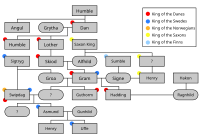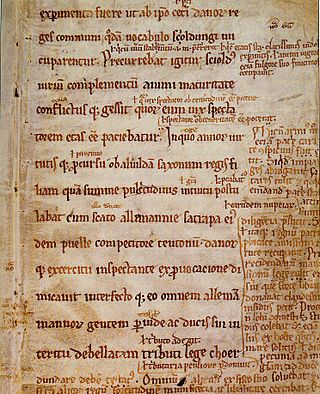
Gesta Danorum is a patriotic work of Danish history, by the 12th-century author Saxo Grammaticus. It is the most ambitious literary undertaking of medieval Denmark and is an essential source for the nation's early history. It is also one of the oldest known written documents about the history of Estonia and Latvia.

Henry VII, also known as Henry Tudor, was King of England and Lord of Ireland from his seizure of the crown on 22 August 1485 until his death in 1509. He was the first monarch of the House of Tudor.

In Norse mythology, Gram, also known as Balmung or Nothung, is the sword that Sigurd used to kill the dragon Fafnir. It is primarily used by the Völsungs in the Volsunga Saga. However, it is also seen in other legends, such as the Thidrekssaga in which it is wielded by Hildebrand.
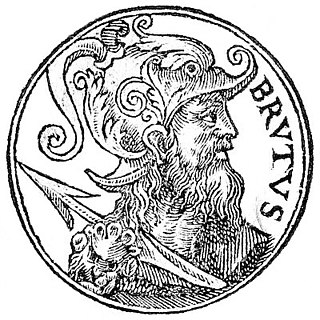
Brutus, also called Brute of Troy, is a mythical British king. He is described as a legendary descendant of the Trojan hero Aeneas, known in medieval British legend as the eponymous founder and first king of Britain. This legend first appears in the Historia Brittonum, an anonymous 9th-century historical compilation to which commentary was added by Nennius, but is best known from the account given by the 12th-century chronicler Geoffrey of Monmouth in his Historia Regum Britanniae.
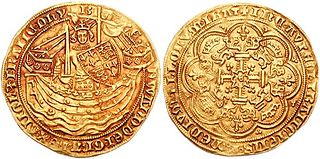
The noble was the first English gold coin produced in quantity, introduced during the second coinage (1344–1346) of King Edward III. It was preceded by the gold penny and the florin, minted during the reign of King Henry III and the beginning of the reign of King Edward III; these saw little circulation. The derivatives of the noble, the half noble and quarter noble, on the other hand, were produced in quantity and were very popular.

Coel, also called Coel Hen and King Cole, is a figure prominent in Welsh literature and legend since the Middle Ages. Early Welsh tradition knew of a Coel Hen, a c. 4th-century leader in Roman or Sub-Roman Britain and the progenitor of several kingly lines in Yr Hen Ogledd, a region of the Brittonic-speaking area of what is now northern England and southern Scotland.

Prince Frederick Henry Ludwig of Prussia was a Prussian general, statesman, and diplomat. He was a son of King Frederick William I of Prussia and Princess Sophia Dorothea of Hanover, and the younger brother of Frederick the Great. Prince Henry led Prussian armies in the Silesian Wars and the Seven Years' War, having never lost a battle in the latter. In 1786, he was suggested as a candidate to be a monarch in the United States.
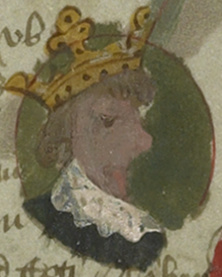
Camber, also Kamber, was the legendary first king of Cambria, according to the Geoffrey of Monmouth in the first part of his influential 12th-century pseudohistory Historia Regum Britanniae. According to Geoffrey, Cambria, the classical name for Wales, was named for him.
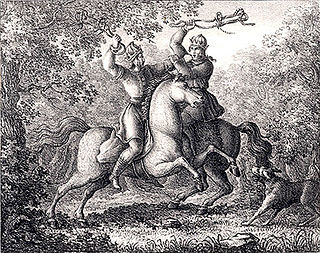
Alaric and Eric, according to legend, were two kings of Sweden.
The Scyldings or Skjǫldungs, both meaning "descendants of Scyld/Skjǫldr", were, according to legends, a clan or dynasty of Danish kings, that in its time conquered and ruled Denmark and Sweden together with part of England, Ireland and North Germany. The name is explained in many texts, such as Friedrich Christoph Dahlmann's 'Research on the Field of History', by the descent of this family from an eponymous king Scyld, but the title is sometimes applied to rulers who purportedly reigned before him, and the supposed king may be an invention to explain the name. There was once a Norse saga on the dynasty, the Skjöldunga saga, but it survives only in a Latin summary by Arngrímur Jónsson.

Signy or Signe is the name of two heroines in two connected legends from Norse mythology which were very popular in medieval Scandinavia. Both appear in the Völsunga saga, which was adapted into other works such as Wagner's 'Ring' cycle, including its famous opera Die Walküre. Signy is also the name of two characters in several other sagas.
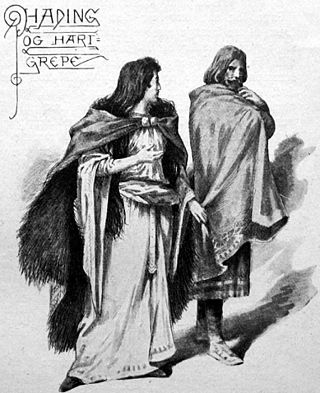
Hadingus was one of the earliest legendary Danish kings according to Saxo Grammaticus' Gesta Danorum, where he has a detailed biography. Georges Dumézil and others have argued that Hadingus was partially modelled on the god Njörðr.
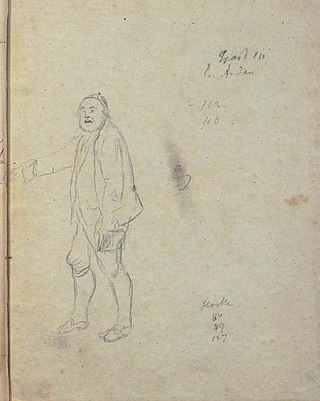
The Feast at Solhaug is the first publicly successful drama by Henrik Ibsen. It was written in 1855 and had its premier at Det norske Theater in Bergen on 2 January 1856. Part of the strength and charm of this play as well as Ibsen's other early poetic works results from the style of the poetic form and the inherent melody of the old ballads for those who speak Scandinavian languages.

Guthorm or Guthormus was one of the earliest legendary Danish kings according to Saxo Grammaticus. He was a son Danish king, Gram and Swedish princess, Groa.
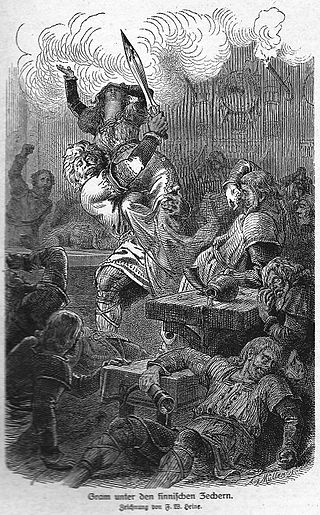
Signe was a legendary Finnish princess mentioned in Gesta Danorum. The realm of her father, Sumble was invaded by the Danish king, Gram of Denmark, but after noticing her, Gram halted the invasion and proposed to her. Before the marriage could be arranged, Gram had to go to Sweden, while he was away her father plotted to marry her off to a Saxon king, Henry. Signe, unhappy with his arrangement, informed Gram, causing Gram to murder Henry during their wedding.
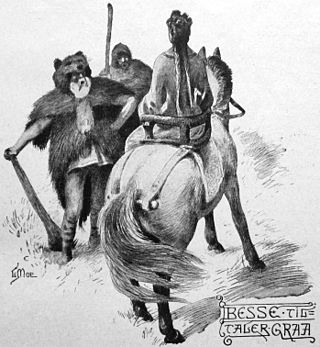
Bess or Bessus was a legendary Danish general mentioned in Gesta Danorum. His master, Prince Gram gave his wife to him after he grew tired of her. Later Bess served as the principal general of Gram during his invasion of Sweden and led the negotiations with the future wife of Gram, Groa. After Gram married Groa, Bess urged the continuation of war, which eventually led to the death of the Swedish king.

Henry or Henricus was a Saxon king mentioned in Gesta Danorum. Having just married Finnish princess, Signe in Finland he was slain by king of the Danes, Gram who crashed the wedding. His murder compelled his retainers to join forces with Gram's enemy, Swipdag, who eventually killed him in battle. Later, Swipdag's grandson was named Henry probably after Henry, poetically this Henry was killed by a son of Gram and Signe, Hading.

Svipdagr or Swipdag was a legendary Swedish king and important figure in Book One of Gesta Danorum. The realm of his father was invaded by a Danish prince, Gram in to order marry, Svipdagr's sister, Groa. The prince was eventually successful and Svipdagr's father, Sigtryg was killed. Svipdagr escaped to Norway and carved himself a kingdom of his own. Later, Gram's act to dishonor his wife compelled Svipdagr to invade Sweden. After Gram murdered the King of the Saxons many Saxons joined Svipdagr's side. The war continued many years and during this time Gram tried to rape Svipdagr's daughter. Finally, Svipdagr was able to kill Gram in battle and took over Sweden and Denmark.

